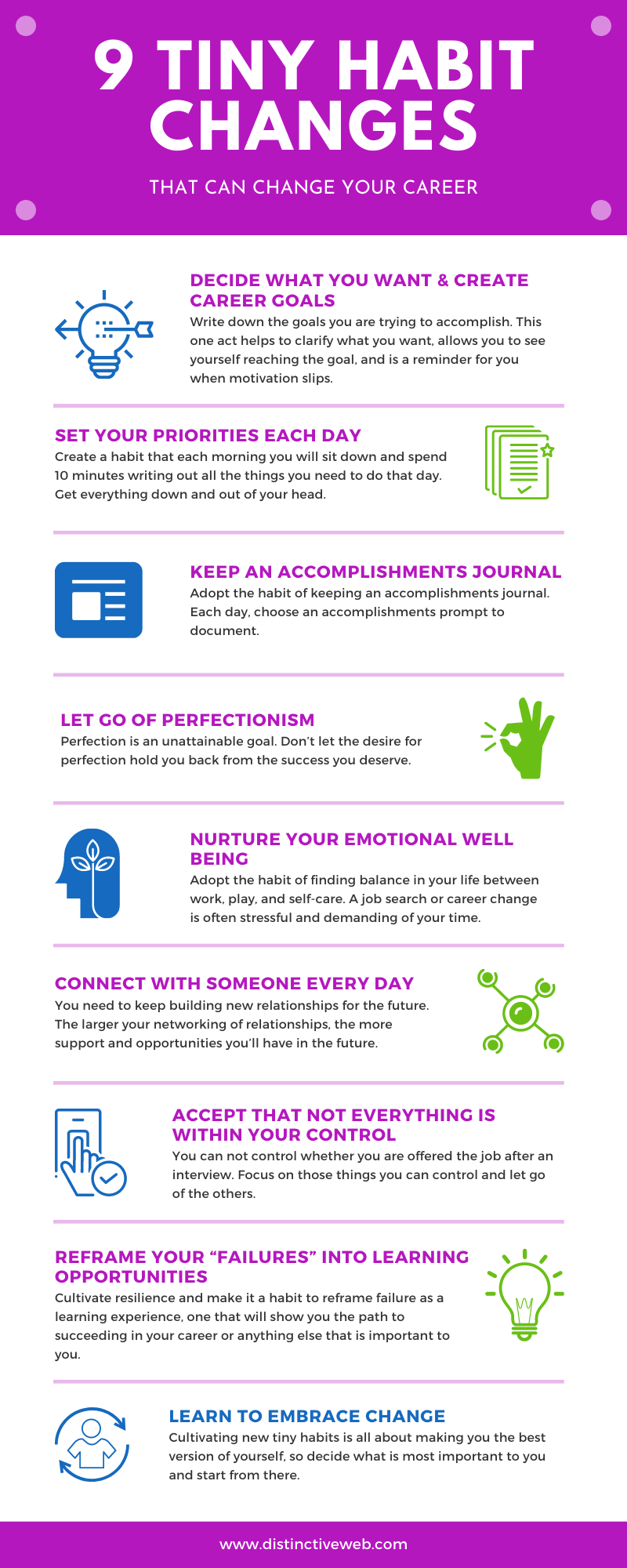
Tiny things can make the biggest impact. Something as simple as reading a book has the potential to change your career. Tiny habits are simply those actions we take every single day without thinking about it. Brushing your teeth twice a day and washing your hands after using the bathroom are just instinctive because it’s what we were taught as kids and that action was reinforced by our parents and our teachers. These tiny habits are also quick and easy, sometimes less than two minutes, so we don’t even notice them taking up any time out of our day.
Habits of all kinds – both good and bad – have compounding effects, which means the more you do something, the greater the results. So, for example, the more frequently you reach out and connect with people in your network, the larger and stronger your professional network will be. On the other hand, a bad habit such as staying up until midnight every night, drinking alcohol and playing video games will have compounding negative effects on your career over time.
Take a moment and think about what you could accomplish in a week, a month, or even a year if you created tiny habits today and kept building them up over time. Trying to make massive changes all at once usually leads to burn out or failure but taking small baby steps with tiny habits toward a bigger goal is doable, sustainable, and a road to success.
Choosing New Tiny Habits Can Change Your Career in Big Ways
Every single area of your life can be improved with the help of tiny habits, and your career is no exception. If you are actively job searching, trying to change your career, or simply trying to grow professionally, adopting the following nine tiny habits can have massive impact.
1) Decide What You Want & Create Career Goals
Give deep though to your vision for your life and your career. Make an honest appraisal of your dreams, skills, past experiences, and values. Quiet your mind and really reflect. In as much detail as possible, describe what you want in your career. What job functions do you want to perform? What industry or industries do you want to work in? What job title or job titles interest you? How much money do you want to make? Do you want to relocate? Travel? Work as a member of a team or independently? Work with people or things? Would you prefer a casual or formal work environment? Be a detailed as you can.
Now turn this vision into goals. Set short-term goals (e.g., this year), mid-term goals (e.g., 5 years), and long-term goals (e.g., 10 years). Make it a habit to check in on your goals and use them to plan your daily to-do schedule. Creating goals set you in the right direction, so you always know you are moving forward. Write down the goals you are trying to accomplish. This one act helps to clarify what you want, allows you to see yourself reaching the goal, and is a reminder for you when motivation slips. Writing down an actual plan for reaching your goal is also essential; otherwise, it just remains a dream rather than something you can accomplish.
2) Set Your Priorities Each Day
For many of us, it never feels like we have enough hours in the day. But the reality is that you do have the time you need — it’s just being taken up by non-essential tasks that are overburdening you and getting in the way of what’s important. When you are job searching or actively working on a career change, it is more important than ever that you stay productive and make the most of your time.
Create a habit that each morning you will sit down and spend 10 minutes writing out all the things you need to do that day. Get everything down and out of your head. Once you are sure your list is complete, go through it and ask yourself: “If I do just one thing today, what should it be?” Put this at the top of your list. Now, ask yourself this same question two more times. These are your highest impact and highest priority tasks. Make a commitment to yourself to complete these three items before tackling anything else on your list. This one small tiny habit change can make a huge positive impact in your daily productivity.
3) Keep An Accomplishments Journal
One of the biggest obstacles to creating or updating your resume or LinkedIn profile is coming up with accomplishments. Adopt the habit of keeping an accomplishments journal. Each day, choose an accomplishments prompt to document. You can choose from this list or come up with your own prompts. Accomplishments are what set great resumes apart from good ones. Accomplishments can win over a hiring manager — since past performance is often a predictor of future success. By engaging in daily activities to help you think about what kind of impact you have in the workplace, you’ll have great content for your interview-winning resume or LinkedIn profile.
Reviewing this accomplishments journal prior to every job interview will give you great stories of success to talk about during the interview. Also, it is easy to get down on yourself during a lengthy job search that isn’t going as well as you had hoped. Your accomplishments journal will shore up your confidence with the daily reminders of all you have accomplished in your career already, and how much value you have to offer in the workplace.
4) Let Go Of Perfectionism
“Perfectionism is a dream killer, because it’s just fear disguised as trying to do your best. It just is.” – Mastin Kipp
Perfectionism can be a debilitating mindset, as it places you in a frozen state, waiting until the perfect opportunity to make a move or try something new. It forces you to work hard at things that are not that important when “good enough” would suffice. Yes, you want your resume to be as strong and persuasive as it can possibly be, but don’t spend hours or days agonizing over a word choice. A single word isn’t going to make or break your career. Yes, maybe you really want to lose 10 pounds, but don’t let the fact that you haven’t yet hold you back prom pursuing the career change you want. Perfection is an unattainable goal. Don’t let the desire for perfection hold you back from the success you deserve.
5) Nurture Your Emotional Well Being
Adopt the habit of finding balance in your life between work, play, and self-care. A job search or career change is often stressful and demanding of your time. It is crucial for your emotional well-being that you take time for yourself. When any one of these aspects takes priority over the others, you will start to feel stressed out, aimless, or disconnected from your own needs. Stress quickly wears down your strength and resolve, making it more likely that you will make unhealthy choices and making it more difficult for you to manage your emotions. Be intentional about creating time for each of these things proportionally in your life to maintain balance and protect your wellness at all times, but especially when job searching.
Also, remember to set boundaries for yourself. When you can limit what you take on, you reduce your stress, resist feeling burned out, and maintain your health, which is crucial for strengthening your own resolve and determination. Job searching and working on efforts to change your career take time, energy, and focus. Safeguard the time you need by setting boundaries around your time and saying “no” when necessary.
6) Connect With Someone Every Day
Building a full circle of both social and professional networking contacts and making time to connect with these people on a daily basis will make a significant impact on both your professional and personal life. The last thing you want to do is let people forget about you. Otherwise, when you need them again, they won’t remember who you are. You also need to keep building new relationships for the future. The larger your networking of relationships, the more support and opportunities you’ll have in the future.
And remember, networking goes both ways. When you do something good for others, it comes back to you many times over. You help others with no expectations or obligations and their natural response is to help you back.
A major benefit of networking is referrals. This means connecting people within your network who have the skills or knowledge that others need. It’s one of the best things you can do for another person. Likewise, people in your network will introduce you to other people you can help or who can help you. In this way, a network grows exponentially.
Make networking a daily habit and set aside time each day to reach out to someone in your network. Even just a quick message on LinkedIn to reconnect with someone you haven’t talked with for a long time, or taking 10 minutes to connect two people in your own network who you know have similar interests, will have a big impact over time
7) Accept That Not Everything Is Within Your Control
Those who worry about things over which they have little control or influence end up feeling frustrated, angry, or useless. Wasting your time on things that are outside your sphere of influence leaves you with less energy for those things that matter, which are those that you can control. You can plan for and control the number of job applications you submit each week. You can control how you prepare for an interview. You can not control whether you are offered the job after an interview. Focus on those things you can control and let go of the others.
8) Reframe Your “Failures” Into Learning Opportunities
Job searching or career changing takes immense time and effort. You are likely to experience many rejections before you reach your goal. Successful professionals do not allow failures to define them or to derail them from their chosen path. Cultivate resilience and make it a habit to reframe failure as a learning experience, one that will show you the path to succeeding in your career or anything else that is important to you.
9) Learn to Embrace Change
When you see change as positive instead of negative, you become more adaptable and flexible, which is vital for helping you deal with the situations you will encounter while job searching and transitioning your career. Those who see change as positive can stop fearing the unknown, which can often be the source of inspiration and success rather than negative outcomes.
Make it a habit to make small changes to your regular routine. Psychologists believe when you become comfortable with new experiences, it is easier to expand more and more of your comfort zone. Support yourself by facing new ideas and situations in small ways. As you learn new things through these experiences, you’ll have the confidence to expand your comfort zone even further.
Think about your daily routine. Can you wear a crazy pair of socks today or pick out a tie you don’t often wear? Try stopping at a different restaurant for breakfast or coffee. Take a different route to work. Use your lunch break to read a magazine that you don’t subscribe to regularly. Grab an afternoon snack from a street vendor you haven’t tried before. Go the movies or cook a dinner you don’t typically make. Changing your daily routine in small ways helps support your professional and personal growth as you learn to embrace change. You might even find new things to enjoy!
Some final thoughts: Cultivating new tiny habits is all about making you the best version of yourself, so decide what is most important to you and start from there. Improving your mindset and daily habits will allow you to accomplish other goals, and becoming the master of your time, motivation, and productivity will all strengthen your ability to be successful in whatever goals you set for yourself.










